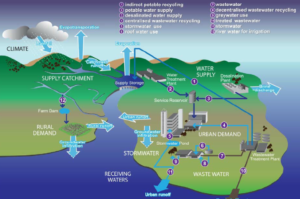
The growing population and fast urbanization have made urban water management an essential component of city design. Often unable to solve the environmental and sustainability issues of contemporary cities, traditional water management techniques Adopting an eco-friendly approach is therefore crucial to guarantee a strong,and sustainable urban water system. This paper explores several approaches and techniques aiming at reaching environmentally friendly urban water management.
Knowing Urban water management
Obstacles in Urban Water Management
Among the various water management issues urban regions deal with include infrastructure deterioration, pollution, water shortage, and flooding. Climate change aggravates these difficulties since it causes more frequent and intense storms. Dealing with these problems calls for creative ideas balancing population requirements with environmental sustainability.
The Requirement for Sustainable Solutions
Large-scale infrastructure projects that can be costly, energy-intensive, and environmentally detrimental are the basis for traditional water management systems. Conversely, environmentally friendly methods concentrate on including sustainable practices and natural processes into water control. These strategies raise the general resilience of urban settings in addition to improving water quality and availability.
Main Approaches for Sustainable Urban Water Management
Green Facilities
Green infrastructure is water management utilizing semi-natural or natural systems. Among these are permeable pavements, rain gardens and green rooftops. By helping to absorb and filter rainwater, these systems lower runoff and hence lessen the likelihood of flooding. Green infrastructure may also help to lower urban heat islands, improve air quality, and increase urban biodiversity.
Efficiency and Conservation of Water
Sustainable urban water management depends critically on encouraging water efficiency and conservation. Public education efforts, incentives for water-saving devices and laws supporting effective water use help to accomplish this. Water usage can be greatly lowered with basic actions such leak repairs, low-flow fixtures, and rainwater collecting systems implementation.
Water Management for Storm Areas
Urban water pollution and floods prevention depend on good stormwater management. Constructed wetlands, retention ponds, and bioswales are among environmentally friendly stormwater management tools. By simulating natural hydrological processes, these systems let stormwater enter, be filtered and gradually flow back into the ground.
Treatment and Reuse of Wastewater
Conventional techniques of wastewater treatment can be ecologically damaging and resource-intensive. More sustainable choices are provided by eco-friendly substitutes such scattered treatment systems and built wetlands. Furthermore lowering the demand for fresh water is the use of treated wastewater for non-potable uses including industrial operations and irrigation.
Environmental Friendly Urban Water Management Case Studies
Singapore : A Water Sustainability Model
Singapore’s creative attitude to urban water management is well-known. The nation now uses a thorough water management plan including rainwater collecting, desalination, and water recycling. One shining illustration of Singapore’s dedication to sustainability is the Marina Barrage, a dam constructed at the mouth of the Marina Channel. It offers recreation, flood control and water supply among other things.
Copenhagen : Combining Environmental Infrastructure
Another city that has effectively included green infrastructure into its water system is Copenhagen, Denmark. To control runoff, the city has installed many rain gardens, permeable pavements and green rooftops. Designed in reaction to extreme flooding in 2011, Copenhagen’s Cloudburst Management Plan emphasizes on building multifunctional urban areas able to absorb and control extra water during heavy rain events.
Melbourne : Urban Water Sensitive Design
Water Sensitive Urban Design (WSUD) has been embraced by Melbourne, Australia, to support environmentally friendly water usage. By merging urban design with water management, WSUD produces environments that improve the natural water cycle. The city’s strategy calls for urban wetlands, green streets and rainwater tanks. With green rooftops, swales and water recycling systems, Melbourne’s Docklands precinct is one prominent example of WSUD in use.
The Part Technology Plays in Sustainable Water Management
Intelligent Water Management Systems
Technological developments have made smart water management systems that maximize water use and lower waste possible. Using sensors, data analytics and real-time monitoring, these systems find leaks, track water quality and control water delivery. For example, smart meters give consumers real-time water use data, therefore promoting effective water use and conservation.
Original Water Treatment Systems
Emerging new water treatment technologies present more environmentally friendly and effective solutions. For example, membrane filtration minimally energy-consumingly removes pollutants from water using sophisticated materials. Furthermore, biofiltration systems purify water using natural processes, therefore lowering the demand for energy-intensive operations and chemical treatments.
Education and Community Involvement Increasing Awareness
Environmental friendly urban water management depends critically on public knowledge and education. Communities have to realize the need of sustainable living and water preservation. School programs, seminars, and educational campaigns can assist to increase awareness and inspire good behavior modification.
Projects Based on Communities
Including communities in water management projects can produce more sustainable and successful results. Neighborhood rain gardens and local water-saving initiatives are among community-based projects that enable citizens to actively manage their water supplies. By encouraging accountability and ownership these projects help to create long-term sustainability.
Policy and Regulatory Structure Supporting Environmental Conscious Behavior
Promoting environmentally friendly urban water management depends much on government policies and laws. Policies encouraging green infrastructure, water conservation, and creative technologies will help to propel general acceptance of sustainable living. Moreover, regulatory systems should guarantee that new projects follow ideas of sustainable water management.
Integrated Control of Water
Coordinating the activities of several stakeholders including government agencies, commercial sector companies, and community organizations an integrated approach to water management ensures Integrated Water Management (IWM) seeks to establish interactions among environmental protection, stormwater management, wastewater treatment, and water supply. This whole strategy guarantees sustainable management of every component of the water cycle.
In summary
Resilient and sustainable cities depend on an environmentally friendly method of urban water management. Urban regions may solve issues of water shortage, flooding, and pollution by adopting green infrastructure, water conservation, smart stormwater management, and creative technologies. Further improving the efficacy of these approaches include community involvement, education, and supporting laws. Adopting sustainable and livable future depends on using environmentally friendly water management techniques while cities keep expanding.